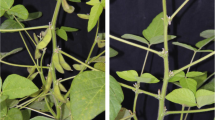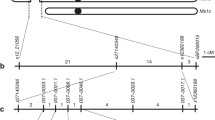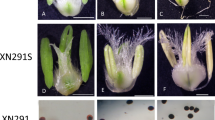Abstract
Key message
Hexaploid bread wheat is not readily amenable to traditional mutagenesis approaches. In this study, we show efficient utilization of CRISPR-Cas system and Next Generation Sequencing for mutant analysis in wheat.
Abstract
Identification and manipulation of male fertility genes in hexaploid bread wheat is important for understanding the molecular basis of pollen development and to obtain novel sources of nuclear genetic male sterility (NGMS). The maize Male sterile 45 (Ms45) gene encodes a strictosidine synthase-like enzyme and has been shown to be required for male fertility. To investigate the role of Ms45 gene in wheat, mutations in the A, B and D homeologs were produced using CRISPR-Cas9. A variety of mutations in the three homeologs were recovered, including a plant from two different genotypes each with mutations in all three homeologs. Genetic analysis of the mutations demonstrated that all three wheat Ms45 homeologs contribute to male fertility and that triple homozygous mutants are required to abort pollen development and achieve male sterility. Further, it was demonstrated that a wild-type copy of Ms45 gene from rice was able to restore fertility to these wheat mutant plants. Taken together, these observations provide insights into the conservation of MS45 function in a polyploid species. Ms45 based NGMS can be potentially utilized for a Seed Production Technology (SPT)-like hybrid seed production system in wheat.





Similar content being viewed by others
References
Adugna A, Nanda G, Singh K, Bains N (2004) A comparison of cytoplasmic and chemically-induced male sterility systems for hybrid seed production in wheat (Triticum aestivum L.). Euphytica 135:297–304
Altschul SF, Gish W, Miller W, Myers EW, Lipman DJ (1990) Basic local alignment search tool. J Mol Biol 215:403–410
Belhaj K, Chaparro-Garcia A, Kamoun S, Nekrasov V (2013) Plant genome editing made easy: targeted mutagenesis in model and crop plants using the CRISPR/Cas system. Plant Methods 9:39
Cameron P, Fuller CK, Donohoue PD, Jones BN, Thompson MS, Carter MM, Gradia S, Vidal B, Garner E, Slorach EM, Lau E, Banh LM, Lied AM, Edwards LS, Settle AH, Capurso D, Llaca V, Deschamps S, Cigan M, Young JK, May AP (2017) Mapping the genomic landscape of CRISPR–Cas9 cleavage. Nat Methods 14:600. https://doi.org/10.1038/nmeth.4284
Chen L, Liu Y-G (2014) Male sterility and fertility restoration in crops. Annu Rev Plant Biol 65:5.1–5.28
Cigan AM, Unger E, Xu R-J, Kendall TL, Fox TW (2001) Phenotypic complementation of ms45 maize requires tapetal expression of MS45. Sex Plant Reprod 14:135–142
Cigan AM, Unger-Wallace E, Haug-Collet K (2005) Transcriptional gene silencing as a tool for uncovering gene function in maize. Plant J 43:929–940
Cigan AM, Haug-Collet K, Clapp J (2014) Transcriptional silencing of heterologous anther promoters in maize: a genetic method to replace detasseling for seed production. Plant Reprod 27:109–120
Cigan AM, Singh M, Benn G, Feigenbutz L, Kumar M, Cho M-J, Svitashev S, Young J (2017) Targeted mutagenesis of a conserved anther-expressed P450 gene confers male sterility in monocots. Plant Biotechnol J 15:379–389. https://doi.org/10.1111/pbi.12633
Ding Y, Li H, Chen L-L, Xie K (2016) Recent advances in genome editing using CRISPR/Cas9. Front Plant Sci. https://doi.org/10.3389/fpls.2016.00703
Dobritsa A, Nishikawa S-I, Preuss D, Urbanczyk-Wochniak E, Sumner L, Hammond A, Carlson A, Swanson R (2009) LAP3, a novel plant protein required for pollen development, is essential for proper exine formation. Sex Plant Reprod 22:167–177
Dong C, Dalton-Morgan J, Vincent K, Sharp P (2009) A modified TILLING method for wheat breeding. Plant Genome 2:39–47
Gaffney J, Anderson J, Franks C, Collinson S, MacRobert J, Woldemariam W, Albertsen M (2016) Robust seed systems, emerging technologies, and hybrid crops for Africa. Glob Food Secur 9:36–44
Gao H, Smith J, Yang M, Jones S, Djukanovic V, Nicholson MG, West A, Bidney D, Falco SC, Jantz D, Lyznik LA (2010) Heritable targeted mutagenesis in maize using a designed endonuclease. Plant J 61:176–187
Jacobs TB, LaFayette PR, Schmitz RJ, Parrott WA (2015) Targeted genome modifications in soybean with CRISPR/Cas9. BMC Biotechnol 15:16. https://doi.org/10.1186/s12896-015-0131-2
Karvelis T, Gasiunas G, Young J, Bigelyte G, Silanskas A, Cigan M, Siksnys V (2015) Rapid characterization of CRISPR-Cas9 protospacer adjacent motif sequence elements. Genome Biol 16:253. https://doi.org/10.1186/s13059-015-0818-7
Kaul MLH (1988) Gene-cytoplasmic male sterility. In: Kaul MLH (ed) Male sterility in higher plants. Springer, Berlin, pp 97–192. https://doi.org/10.1007/978-3-642-83139-3_3
Kempe K, Gils M (2011) Pollination control technologies for hybrid breeding. Mol Breed 27:417–437. https://doi.org/10.1007/s11032-011-9555-0
Krasileva KV, Vasquez-Gross HA, Howell T, Bailey P, Paraiso F, Clissold L, Simmonds J, Ramirez-Gonzalez RH, Wang X, Borrill P (2017) Uncovering hidden variation in polyploid wheat. Proc Natl Acad Sci USA 114:E913–E921
Longin CFH, Mühleisen J, Maurer HP, Zhang H, Gowda M, Reif JC (2012) Hybrid breeding in autogamous cereals. Theor Appl Genet 125:1087–1096. https://doi.org/10.1007/s00122-012-1967-7
Ma H (2005) Molecular genetic analysis of microsporogenesis and microgametogenesis in flowering plants. Annu Rev Plant Biol 56:393–434. https://doi.org/10.1146/annurev.arplant.55.031903.141717
Ma J, Stiller J, Wei Y, Zheng Y-L, Devos KM, Doležel J, Liu C (2014) Extensive Pericentric rearrangements in the bread wheat (Triticum aestivum L.) genotype “chinese spring” revealed from chromosome shotgun sequence data. Genome Biol Evol 6:3039–3048. https://doi.org/10.1093/gbe/evu237
McRae DH (1985) Advances in chemical hybridization. In: Plant breeding reviews. Wiley, Hoboken, pp 169–191. https://doi.org/10.1002/9781118061008.ch3
Mette MF, Gils M, Longin CFH, Reif JC (2015) Hybrid breeding in wheat. In: Ogihara Y, Takumi S, Handa H (eds) Advances in wheat genetics: from genome to Field: Proceedings of the 12th International Wheat Genetics Symposium. Springer, Tokyo, pp 225–232. https://doi.org/10.1007/978-4-431-55675-6_24
Mukai Y, Tsunewaki K (1979) Basic studies on hybrid wheat breeding. Theor Appl Genet 54:153–160. https://doi.org/10.1007/bf00263045
Peng R, Lin G, Li J (2016) Potential pitfalls of CRISPR/Cas9-mediated genome editing. FEBS J 283:1218–1231. https://doi.org/10.1111/febs.13586 doi
Pickett AA, Galwey NW (1997) A further evaluation of hybrid wheat. Plant Varieties Seeds 10:15–32
Shi J, Cui M, Yang L, Kim Y-J, Zhang D (2015) Genetic and biochemical mechanisms of pollen wall development. Trends Plant Sci 20:741–753. https://doi.org/10.1016/j.tplants.2015.07.010
Singh M, Kumar M, Thilges K, Cho M-J, Cigan AM (2017) MS26/CYP704B is required for anther and pollen wall development in bread wheat (Triticum aestivum L.) and combining mutations in all three homeologs causes male sterility. PLoS ONE 12:e0177632. https://doi.org/10.1371/journal.pone.0177632
Slade AJ, Fuerstenberg SI, Loeffler D, Steine MN, Facciotti D (2005) A reverse genetic, nontransgenic approach to wheat crop improvement by TILLING. Nat Biotechnol 23:75–81. http://www.nature.com/nbt/journal/v23/n1/suppinfo/nbt1043_S1.html doi
Song G, Jia M, Chen K, Kong X, Khattak B, Xie C, Li A, Mao L (2016) CRISPR/Cas9: a powerful tool for crop genome editing. Crop J 4:75–82
Svitashev S, Young JK, Schwartz C, Gao H, Falco SC, Cigan AM (2015) Targeted mutagenesis, precise gene editing, and site-specific gene insertion in maize using Cas9 and guide RNA. Plant Physiol 169:931–945. https://doi.org/10.1104/pp.15.00793
Svitashev S, Schwartz C, Lenderts B, Young JK, Cigan AM (2016) Genome editing in maize directed by CRISPR–Cas9 ribonucleoprotein complexes. Nat Commun 7:13274. https://doi.org/10.1038/ncomms13274
Tilman D, Balzer C, Hill J, Befort BL (2011) Global food demand and the sustainable intensification of agriculture. Proc Natl Acad Sci USA 108:20260–20264. https://doi.org/10.1073/pnas.1116437108
Tucker EJ, Baumann U, Kouidri A, Suchecki R, Baes M, Garcia M, Okada T, Dong C, Wu Y, Sandhu A, Singh M, Langridge P, Wolters P, Albertsen MC, Cigan AM, Whitford R (2017) Molecular identification of the wheat male fertility gene Ms1 and its prospects for hybrid breeding. Nat Commun 8:869
Wang Y, Cheng X, Shan Q, Zhang Y, Liu J, Gao C, Qiu J-L (2014) Simultaneous editing of three homoeoalleles in hexaploid bread wheat confers heritable resistance to powdery mildew. Nat Biotechnol 32:947–951. https://doi.org/10.1038/nbt.2969
Weeks DP (2017) Gene editing in polyploid crops: wheat, camelina, canola, potato, cotton, peanut, sugar cane, and citrus. Prog Mol Biol Transl Sci 149:65–80. https://doi.org/10.1016/bs.pmbts.2017.05.002
West PC, Gerber JS, Engstrom PM, Mueller ND, Brauman KA, Carlson KM, Cassidy ES, Johnston M, MacDonald GK, Ray DK, Siebert S (2014) Leverage points for improving global food security and the environment. Science 345:325–328. https://doi.org/10.1126/science.1246067
Whitford R, Fleury D, Reif JC, Garcia M, Okada T, Korzun V, Langridge P (2013) Hybrid breeding in wheat: technologies to improve hybrid wheat seed production. J Exp Bot 64:5411–5428. https://doi.org/10.1093/jxb/ert333
Wilson JA, Ross WM (1962) Male sterility interaction of the Triticum aestivum nucleus and Triticum timopheevi cytoplasm, vol 14, Kyoto University, Kyoto
Wilson ZA, Zhang D-B (2009) From Arabidopsis to rice: pathways in pollen development. J Exp Bot 60:1479–1492. https://doi.org/10.1093/jxb/erp095
Woo JW, Kim J, Kwon SI, Corvalan C, Cho SW, Kim H, Kim S-G, Kim S-T, Choe S, Kim J-S (2015) DNA-free genome editing in plants with preassembled CRISPR-Cas9 ribonucleoproteins. Nat Biotechnol 33:1162–1164. https://doi.org/10.1038/nbt.3389
Wu Y, Fox TW, Trimnell MR, Wang L, Xu R-j, Cigan AM, Huffman GA, Garnaat CW, Hershey H, Albertsen MC (2016) Development of a novel recessive genetic male sterility system for hybrid seed production in maize and other cross-pollinating crops. Plant Biotechnol J 14:1046–1054. https://doi.org/10.1111/pbi.12477
Zhang D, Yang L (2014) Specification of tapetum and microsporocyte cells within the anther. Curr Opin Plant Biol 17:49–55
Zhang Y, Liang Z, Zong Y, Wang Y, Liu J, Chen K, Qiu J-L, Gao C (2016) Efficient and transgene-free genome editing in wheat through transient expression of CRISPR/Cas9 DNA or RNA. Nat Commun 7:12617. https://doi.org/10.1038/ncomms12617
Zhang D, Wu S, An X, Xie K, Zhou Y, Xu L, Fang W, Liu S, Liu S, Zhu T (2017a) Construction of a multi-control sterility system for a maize male-sterile line and hybrid seed production based on the ZmMs7 gene encoding a PHD-finger transcription factor. Plant Biotechnol J. https://doi.org/10.1111/pbi.12786
Zhang Y, Bai Y, Wu G, Zou S, Chen Y, Gao C, Tang D (2017b) Simultaneous modification of three homoeologs of TaEDR1 by genome editing enhances powdery mildew resistance in wheat. Plant J 91:714–724. https://doi.org/10.1111/tpj.13599
Acknowledgements
The authors thank Kara Califf for valuable comments and editorial assistance in preparation of this manuscript. The authors also thank Tracey Fisher, Maria Federova, and Jim Gaffney for their critical review of the manuscript. Technical help provided by Myeong-Je Cho and Sergei Svitashev for plant transformation, Wang-Nan Hu for QRT-PCR, and Katherine Thilges for microscopy is gratefully acknowledged.
Author information
Authors and Affiliations
Contributions
Conceptualization: Mark Cigan, Manjit Singh, Josh Young, Investigation: Manjit Singh, Manish Kumar, Josh Young, Writing—original draft: Manjit Singh, Mark Cigan, Writing—review & editing: Manjit Singh, Mark Cigan, Marc Albertsen.
Corresponding author
Ethics declarations
Conflict of interest
All authors are current or former employees of DuPont Pioneer. MS and AMC are inventors on a provisional patent application on this work and are current or former employees of DuPont Pioneer, who owns the patent application.
Electronic supplementary material
Below is the link to the electronic supplementary material.
Rights and permissions
About this article
Cite this article
Singh, M., Kumar, M., Albertsen, M.C. et al. Concurrent modifications in the three homeologs of Ms45 gene with CRISPR-Cas9 lead to rapid generation of male sterile bread wheat (Triticum aestivum L.). Plant Mol Biol 97, 371–383 (2018). https://doi.org/10.1007/s11103-018-0749-2
Received:
Accepted:
Published:
Issue Date:
DOI: https://doi.org/10.1007/s11103-018-0749-2




